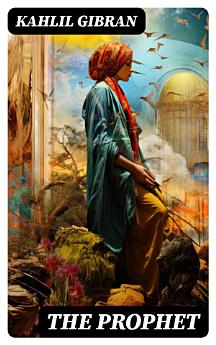The Prophet
Nov 2023 · DigiCat
Ebook
1213
Pages
family_home
Eligible
info
reportRatings and reviews aren’t verified Learn More
About this ebook
Kahlil Gibran's 'The Prophet' is a lyrical masterpiece that intertwines poetry and philosophical reflection. Composed in 1923, this profound work explores universal themes such as love, joy, sorrow, and freedom through the voice of Almitra, a prophet who imparts wisdom to the people of Orphalese. Gibran's literary style is marked by evocative imagery and rhythmic prose, embedding deep spiritual insights within simple yet profound parables. The book's structure, consisting of 26 poetic essays, echoes the traditions of Eastern literary forms, particularly reminiscent of Sufi poetry and biblical texts, which serve as its cultural touchstones. Kahlil Gibran, a Lebanese-American poet, artist, and philosopher, was deeply influenced by his multicultural background and personal experiences, including his immigrant journey to the United States. His exposure to various philosophical and spiritual traditions imbued his writing with a unique blend of Eastern mysticism and Western thought. Gibran's own struggles with identity and belonging resonate throughout 'The Prophet', making it not just a literary work, but a reflection of his quest for meaning in an increasingly complex world. Readers looking for inspiration and a deeper understanding of human existence will find 'The Prophet' a timeless companion. With its profound insights and poetic beauty, it encourages contemplation of life's fundamental truths. Ideal for both casual readers and those seeking a philosophical awakening, Gibran's work transcends cultural boundaries, making it a staple in the libraries of both spiritual seekers and literature lovers.
About the author
Kahlil Gibran, born on January 6, 1883, in Bsharri, modern-day Lebanon, was an illustrious Lebanese-American writer, poet, visual artist, and philosopher, widely respected for his literary contributions that blend Eastern and Western cultural themes. His opus, 'The Prophet,' published in 1923, is a masterpiece consisting of 26 poetic essays and is arguably his most celebrated work, achieving great popularity during the 1960s counterculture movement and remaining influential to this day. It delves into life and the human condition, traversing topics such as love, freedom, and spirituality with lyrical grace and a cadence that echoes the wisdom literature of his native Middle Eastern tradition. Gibran wrote in both English and Arabic, exhibiting a narrative style replete with evocative symbolism and rich allegory. His writings espouse a universal philosophy that transcends the dogma of his time, earning him a unique place as a literary bridge between cultures. Gibran's broader oeuvre encompasses a diverse range of philosophical essays, romantic stories, and mystical poetry that continue to resonate with readers worldwide, securing his legacy as a progressive thinker and a foremost figure of early 20th-century literature. He died on April 10, 1931, in New York City, leaving behind a legacy that immortalizes his dedication to exploring the depths of human experience and emotion. His works, including 'The Prophet,' are cherished for their profound insight and the enduring beauty of their expression.
Rate this ebook
Tell us what you think.
Reading information
Smartphones and tablets
Install the Google Play Books app for Android and iPad/iPhone. It syncs automatically with your account and allows you to read online or offline wherever you are.
Laptops and computers
You can listen to audiobooks purchased on Google Play using your computer's web browser.
eReaders and other devices
To read on e-ink devices like Kobo eReaders, you'll need to download a file and transfer it to your device. Follow the detailed Help Center instructions to transfer the files to supported eReaders.








